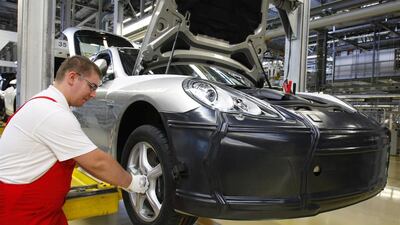Back in 2007, I visited Porsche’s factory in Leipzig, Germany, to witness the final examples of the company’s infamous Carrera GT supercar. While I was there, I was taken on a tour of the production lines where the Cayenne was also being built. This was before the days of the Panamera, and I spotted a couple of heavily disguised examples around the factory before guards moved in and blocked my view. It turned out that the thing looked far better with all that camouflage on.
During the tour, I asked whether Porsche would ever build a diesel model, and was given an immediate, emphatic: “Nein.” Porsche, my guide reminded me, was a maker of “driver’s cars”, and a diesel would never fit in with that.
Nowadays, though, the company is making diesel Cayennes, Panameras and Macans, obviously having seen the writing on the wall: that to enjoy healthy sales in Europe, oil burners are essential. And there are hybrids in the range, too. Market forces almost always dictate the end results, no matter what a company says of its intentions to stay special.
Last week, Reuters reported that Porsche’s chief executive Oliver Blume had gone on record to say that his company won’t be joining the race for autonomous car production. “One wants to drive a Porsche by oneself,” he said.
There is a case to be made for autonomous cars, don’t get me wrong. For many, the car is nothing more than a means to an end – a way of getting from A to B with the minimum of fuss while in their own personal space. The prospect of being able to check Facebook updates, read the news headlines or catch up with writing an urgent report while the car pilots itself is appealing. And then there’s the very obvious benefit – once the technology is ready – of never colliding with another vehicle.
But what about the simple, unbridled thrills afforded by driving? It’s true that many modern cars are so technically advanced that they practically do everything for the driver anyway, and one has to do little more than turn the wheel while keeping an eye on surroundings, but Porsche seems to know that there’s no real joy to this.
Perhaps this is why the company has been active in promoting manual transmissions, while others are busy discontinuing them, even as options. You can no longer buy a manual Ferrari or Lamborghini. The delights of rowing your own gears with an open-gate shifter are vanishing into the mists of time, but like the resurgence of the vinyl record, will manuals eventually return as transmissions of choice for those who love driving?
Blume isn’t intent on making Porsche an archaic company appealing only to hipsters and wannabe race drivers, though. On the contrary, he says he wants every model the company makes to be available as a plug-in hybrid, and its evergreen 911 is currently in development as such – a move that seems necessary is these more enlightened times.
In the past decade, we have witnessed a huge resurgence in the popularity of mechanical wristwatches, and this may be a sign that not all of us are content with computers doing everything for us. Some of us like to see, hear and feel things working mechanically – to achieve sensory satisfaction. Let’s just hope that, unlike the introduction of diesel power trains to its “driver’s” cars, Porsche really does continue its stand to keep the magic of driving alive and well.
motoring@thenational.ae
Follow us @LifeNationalUAE
Follow us on Facebook for discussions, entertainment, reviews, wellness and news.

